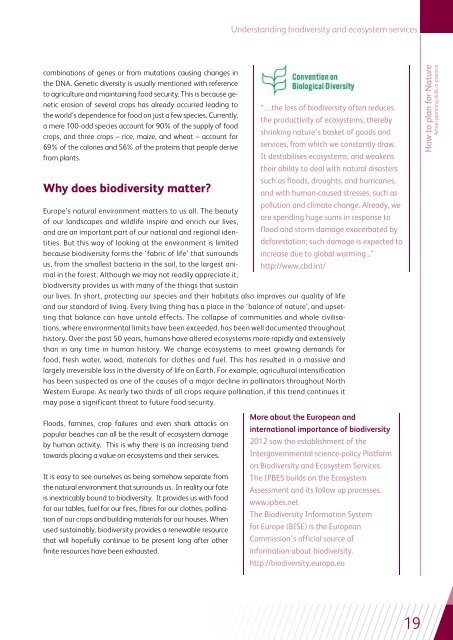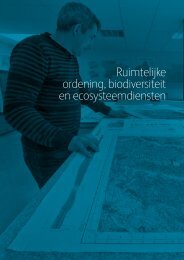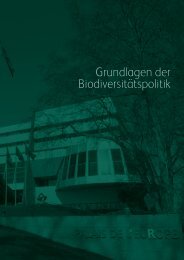ENG Chapter 1 - Biodiversity Skills
ENG Chapter 1 - Biodiversity Skills
ENG Chapter 1 - Biodiversity Skills
Create successful ePaper yourself
Turn your PDF publications into a flip-book with our unique Google optimized e-Paper software.
Understanding biodiversity and ecosystem servicescombinations of genes or from mutations causing changes inthe DNA. Genetic diversity is usually mentioned with referenceto agriculture and maintaining food security. This is because geneticerosion of several crops has already occurred leading to “…the loss of biodiversity often reducesthe world’s dependence for food on just a few species. Currently,the productivity of ecosystems, therebya mere 100-odd species account for 90% of the supply of foodshrinking nature’s basket of goods andcrops, and three crops – rice, maize, and wheat – account for69% of the calories and 56% of the proteins that people derive services, from which we constantly draw.from plants.It destabilises ecosystems, and weakenstheir ability to deal with natural disasterssuch as floods, droughts, and hurricanes,Why does biodiversity matter?and with human-caused stresses, such aspollution and climate change. Already, weEurope’s natural environment matters to us all. The beautyare spending huge sums in response toof our landscapes and wildlife inspire and enrich our lives,and are an important part of our national and regional identities.But this way of looking at the environment is limited deforestation; such damage is expected toflood and storm damage exacerbated bybecause biodiversity forms the ‘fabric of life’ that surrounds increase due to global warming...”us, from the smallest bacteria in the soil, to the largest animalin the forest. Although we may not readily appreciate it,http://www.cbd.int/biodiversity provides us with many of the things that sustainour lives. In short, protecting our species and their habitats also improves our quality of lifeand our standard of living. Every living thing has a place in the ‘balance of nature’, and upsettingthat balance can have untold effects. The collapse of communities and whole civilisations,where environmental limits have been exceeded, has been well documented throughouthistory. Over the past 50 years, humans have altered ecosystems more rapidly and extensivelythan in any time in human history. We change ecosystems to meet growing demands forfood, fresh water, wood, materials for clothes and fuel. This has resulted in a massive andlargely irreversible loss in the diversity of life on Earth. For example, agricultural intensificationhas been suspected as one of the causes of a major decline in pollinators throughout NorthWestern Europe. As nearly two thirds of all crops require pollination, if this trend continues itmay pose a significant threat to future food security.Floods, famines, crop failures and even shark attacks onpopular beaches can all be the result of ecosystem damageby human activity. This is why there is an increasing trendtowards placing a value on ecosystems and their services.It is easy to see ourselves as being somehow separate fromthe natural environment that surrounds us. In reality our fateis inextricably bound to biodiversity. It provides us with foodfor our tables, fuel for our fires, fibres for our clothes, pollinationof our crops and building materials for our houses. Whenused sustainably, biodiversity provides a renewable resourcethat will hopefully continue to be present long after otherfinite resources have been exhausted.More about the European andinternational importance of biodiversity2012 saw the establishment of theIntergovernmental science-policy Platformon <strong>Biodiversity</strong> and Ecosystem Services.The IPBES builds on the EcosystemAssessment and its follow up processes.www.ipbes.netThe <strong>Biodiversity</strong> Information Systemfor Europe (BISE) is the EuropeanCommission’s official source ofinformation about biodiversity.http://biodiversity.europa.euHow to plan for NatureAction planning skills in practice19







